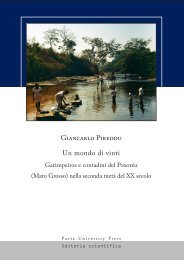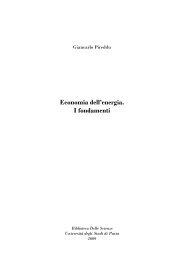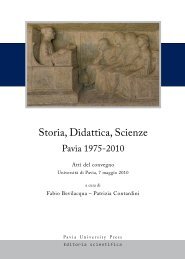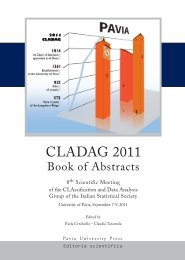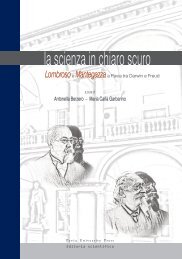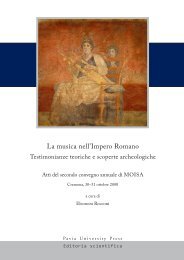Musica che affronta il silenzio - Scritti su Toru Takemitsu - Pavia ...
Musica che affronta il silenzio - Scritti su Toru Takemitsu - Pavia ...
Musica che affronta il silenzio - Scritti su Toru Takemitsu - Pavia ...
Create successful ePaper yourself
Turn your PDF publications into a flip-book with our unique Google optimized e-Paper software.
156<br />
Giangiorgio Pasqualotto<br />
which everything opens out onto the garden and the outside space. This was indeed absolutely<br />
revolutionary, as the Bauhaus architects were quick to perceive.<br />
This perspective – by which the empty background is never seen as a static or inert<br />
reality but as the inexhaustible matrix of forms – can be recognised just as clearly in<br />
poetry, and in particular in the haiku, where, as in the music of Takemit<strong>su</strong>, the interrelationship<br />
between underlying s<strong>il</strong>ence and ‘<strong>su</strong>rface’ sound is fundamental. In its simplicity<br />
the haiku manages to present the event in Nishida’s or Takemit<strong>su</strong>’s perspective of pure<br />
experience, without the intervention of a commentator. This interrelationship is communicated<br />
with a particular and highly original efficacy through the use of linguistic terms<br />
known as kireji, cutting words, <strong>su</strong>ch as ya, kana, kamo, keri, which have no specific<br />
meaning but indicate a pause, a <strong>su</strong>spension, an ‘emptiness’ in the body of the poem. 7 In<br />
haiku poetry linguistic formalization leads the imagination to conceive of something<br />
which is not a complete representation, a ‘picture’, but rather the dissolution of the frame.<br />
Take, for example, this haiku by Bash:<br />
kane kiete the bell fades away,<br />
hana no ka wa t<strong>su</strong>ku the blossoms’ fragrance ringing:<br />
yube kana early evening – (Bash 2004: 32)<br />
In the translation of these extraordinary lines, the <strong>su</strong>spension is indicated by the dash, but<br />
the meaning is well caught in the verb ‘fade away’. The s<strong>il</strong>ence which follows on from<br />
the sound of a bell is not absolute, but fraught with the gradual fading out of the bell’s<br />
vibrations. This progressive fade away of the sound is what in fact connects the sound<br />
itself with s<strong>il</strong>ence, in other words with what underlay it and gave it origin, just as it generates<br />
every other sound, noise or musical note. There is no connotation of melancholy in<br />
this ‘movement towards s<strong>il</strong>ence’, in spite of the typical Japanese stereotype of yearning<br />
for the ephemeral. Instead, it is the attention to nuance of fading away, of transforming<br />
itself, moving towards a background in the form of nature, s<strong>il</strong>ence or the blank sheet<br />
which is truly Japanese.<br />
In his music I believe Takemit<strong>su</strong> pays particular attention to these links connecting<br />
sounds to their s<strong>il</strong>ent underlay. It is <strong>su</strong>rely not a coincidence if Takemit<strong>su</strong> was<br />
greatly interested in John Cage’s investigation of the dynamics of s<strong>il</strong>ence. In this<br />
context I would recall the episode – recorded by Cage himself (1961: 8) – which occurred<br />
at Harvard in 1951. Isolated in an anechoic chamber, Cage found that he was<br />
hearing two sounds, one high-pit<strong>che</strong>d and the other low. The sound technician told<br />
him that he was hearing, respectively, the functioning of his own nervous system and<br />
his blood circulating. Clearly this experience goes to dissolve the opposition between<br />
sound and s<strong>il</strong>ence, demonstrating that there is in fact a tangible continuity between<br />
7<br />
Translations of this verse into Western languages tend to render these kireji (cut words) using dots or<br />
brackets or a dash.



